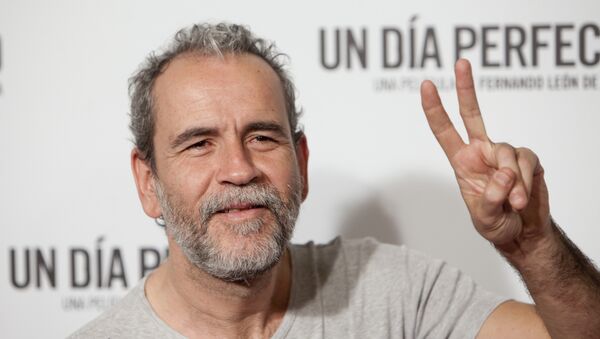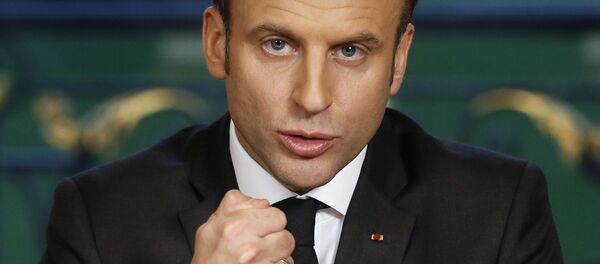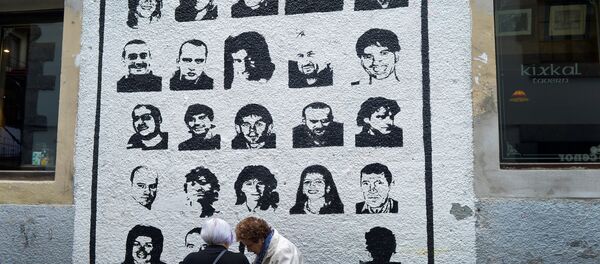The episode began in July 2017, when Toledo made a Facebook post about the court case of three women charged for parading a plastic vagina through the streets of the Spanish city of Seville on May Day in 2014. Dubbed "Procession of the Holy Insubordinate Pussy," the women carried the 2-meter-tall, exquisitely detailed vagina in a way that mocked the traditional Holy Week processions, in which devotees typically carry a figure of the Virgin Mary, New York Transatlantic reported.
Toledo's furious post denounced the case against the women, saying, "I sh*t on God and have enough sh*t left over to sh*t on the dogma of the holiness and virginity of the Virgin Mary. This country is unbearably shameful. I'm disgusted. Go f*ck yourselves. Long live the Insubordinate Pussy."
The Spanish Association of Christian Lawyers, taking issue with Toledo's comments, filed a complaint against him for "for sh*tting on the dogma, and because his words were an offense against religious sentiment," according to group's president, Polonia Castellanos, El Pais reported.
Spanish journalist Helena Villar told Sputnik Friday that the Catholic Church enjoys enormous power in Spain, a consequence of the Francisco Franco era, which she called "a national Catholic dictatorship, where the church was one more power of the state."
"Many of those privileges" still exist, she said: the church controls an enormous amount of property, is exempt from taxes and is protected under the penal code from criticism, along with other religions.
El Pais noted that Article 525 of the Spanish Criminal Code punishes those who offend the feelings of the members of a religious confession by "publicly disparaging their dogmas, beliefs, rites or ceremonies" with monetary fines, which also covers those who publicly disparage people "who do not profess any religion or belief whatsoever."
Toledo ignored multiple summons by the court, saying he had not "committed any offense and so there is no need to appear before a judge," the Independent noted.
"From here, I would like to inform the hitmen from the Francoist Borbón Spanish regime that I have absolutely no intention of wasting a single second of my life by appearing before your most illustrious lordships," he said in response to the March summons.
Its patience exhausted, in June the court ordered Toledo detained for questioning. He was arrested Wednesday and detained overnight until appearing in court the following morning.
As Toledo was brought into the courtroom Thursday, escorted by police but not shackled or cuffed, he shouted at the judge and lawyers: "You should disappear from the face of the Earth," El Pais reported.
Aside from their complaint about his comments on the Insubordinate Pussy trial, the lawyers' association also asked the judge to consider whether or not Toledo had committed a hate crime by stating on television that people executed during the 1936 to 1939 Spanish Civil War because of their religious faith "must have done something" to deserve it, El Pais noted.
The actor was released following the court hearing. Outside the courthouse, he told reporters he hadn't "committed any kind of crime" and that his refusal to respond to court summons, forcing the police to come get him and drag him there, was "an act of civil disobedience."
"I am doing what I have to do, which is to draw attention to this, because it is shameful that there are still five articles in the criminal code related to religious sentiments," he said.
The crowd reportedly yelled "I sh*t on God!," a common Spanish curse, as he exited the building to applause.
"Willy Toledo himself wanted this situation," Villar said, "in order to open the relevant debate on whether it is lawful that such crimes still exist in the Spanish penal code, which open the door for ultra-religious organizations to initiate legal persecutions."
Villar said that "if Willy Toledo had presented himself the first time the judge had mentioned him, he would never have been arrested. Nor will he go to prison for this."
"He is a controversial person that generates debate, but it is precisely what he seeks. [He] has many detractors, but also admirers."
Villar noted that Spain is in the midst of a national discussion on a number of issues that at least some sectors of society think have not been resolved in its transition from dictatorship to democracy. "One is the role of the church," she said. "It is in this context that this debate is exploding."
Toledo's actions have come amid a growing debate in Spain on the question of free speech. In March of this year, just days before Toledo first balked at the court summons, the European Court of Human Rights ruled in favor of two men punished in 2007 by Spain's National Court for having burned a picture of the Spanish king, Juan Carlos, overruling Spain's high court by pointing out it had violated Article 10 of the European Convention of Human Rights, which says that the right to free speech includes "freedom to hold opinions and to receive and impart information and ideas without interference by public authority," New York Transatlantic noted at the time.
Scores of Spanish cases concerning free speech have arisen this year, many in response to Article 578 of the Spanish Criminal Code, which lays out punishments for the vague crime of "glorification of terrorism," Amnesty International noted. In February, the Spanish Supreme Court sentenced rapper Valtonyc to three-and-a-half years in prison under the law for lyrics in a song he wrote six years ago that praised the Basque group "Basque Homeland and Liberty" (ETA), criticized and insulted the monarchy and promoted violence against businessmen as well as conservative politicians. ETA was the main group in the Basque National Liberation Movement, waging a guerrilla war against the Spanish government sporadically since 1968 with the goal of achieving independence for the Basque country from Spain. Both Spain and the European Union consider ETA a terrorist organization.






